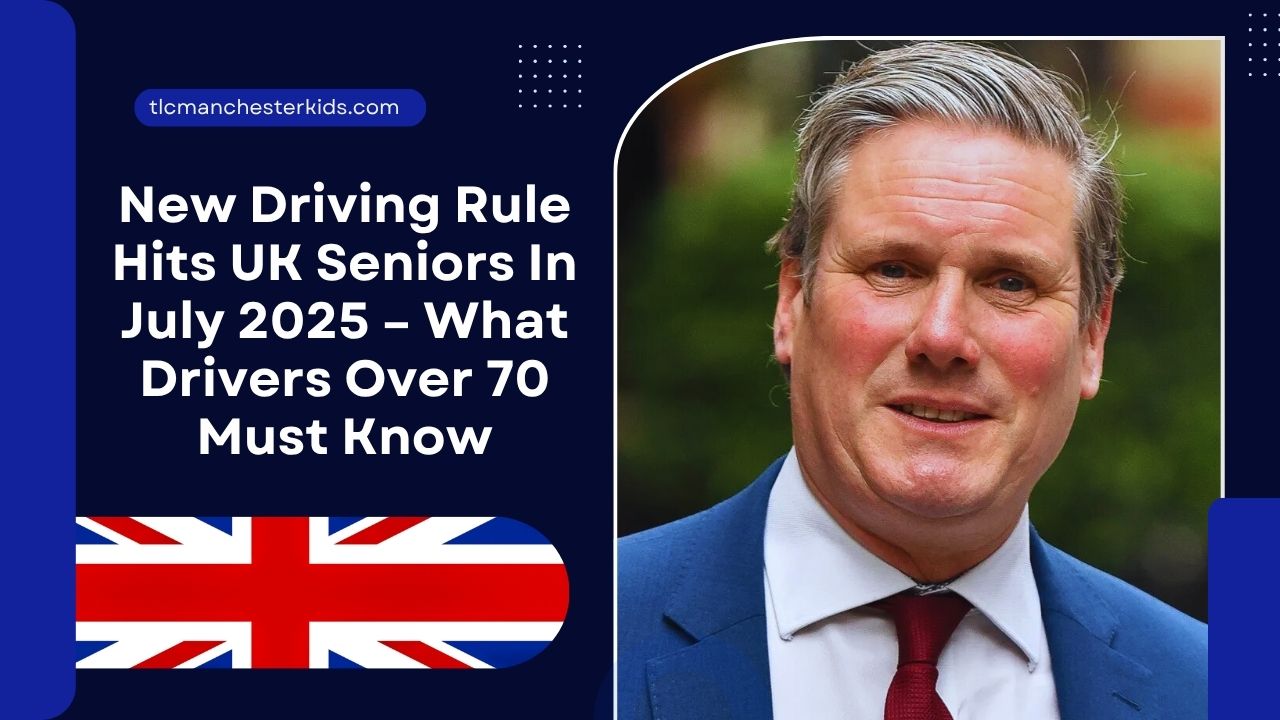Starting July 2025, a major update will affect how UK drivers aged 70 and above maintain their legal right to drive. With concerns about health-related driving risks increasing among older citizens, new guidance aims to reinforce road safety while ensuring continued independence for senior motorists.
But recent rumors of blanket medical testing and forced driving bans have caused confusion. This article breaks down the real changes, what’s true, what’s not, and how to prepare.
What’s Changing for Drivers Aged 70 and Over?
Currently, drivers aged 70 and over are required to renew their driving licence every three years by completing a self-assessment form confirming their fitness to drive. This includes declaring any medical conditions that could affect driving.
From July 2025, although the renewal process remains, there will be greater focus on medical fitness and vision—but not all drivers will be subjected to mandatory tests.
Key Changes Include:
| Requirement | Current Rule | New Rule (From July 2025) |
|---|---|---|
| Licence Renewal Age | 70 | 70 (Unchanged) |
| Renewal Frequency | Every 3 years | Every 3 years (Unchanged) |
| Medical Declaration | Self-assessed | Still self-declared; GP form may be required if flagged |
| Vision & Cognitive Testing | Rarely requested | Required only for flagged or high-risk cases |
| DVLA Fitness Reviews | Based on form info | Random spot-checks and reviews may increase |
Why Is the Rule Changing?
The UK has seen a steady rise in drivers aged 70 and above, many of whom remain safe and responsible drivers. However, with age, there’s an increased risk of cognitive decline, vision issues, and slower reaction times, which could impact safety.
This shift in policy is designed to:
- Address public concerns about senior driver safety
- Ensure that health-related risks are managed proactively
- Encourage honest self-assessment and medical transparency
It’s important to note that the update is not about revoking licences, but rather about ensuring those who continue to drive are medically fit to do so.
What This Means for Senior Drivers
If you or a loved one is 70 or older, here’s how this change could impact you:
- Medical Evidence May Be Required: If you declare a health issue or are flagged, the DVLA may ask for a GP’s signed confirmation that you are fit to drive.
- Increased Processing Time: More thorough checks could lead to longer licence renewal times, especially if further medical review is needed.
- Potential Out-of-Pocket Costs: Although licence renewals remain free, you may need to pay for a GP visit or eye test if required.
- Driving Restrictions Possible: If health conditions are discovered, the licence may be issued with conditions (e.g., daylight-only driving).
Tips to Prepare for the 2025 Changes
To avoid disruption and maintain driving privileges without stress, follow these key steps:
1. Schedule GP Appointments Early
Don’t wait until the last minute. If you know a health condition could be questioned, speak with your doctor ahead of time.
2. Keep Medical Records Up-to-Date
If you’ve received treatment for any condition affecting your driving—such as epilepsy, vision problems, or dementia—have your documentation ready.
3. Be Honest on Renewals
Always accurately declare health conditions. Failing to do so could invalidate your licence or insurance.
4. Stay Informed
Check for any DVLA updates throughout 2025 regarding renewal procedures, especially if further guidance is issued.
5. Explore Alternative Transport
If you’re concerned about losing your licence temporarily, start researching public transport, ride-share options, or local community services for seniors.
Notable Exceptions
Some specific groups of drivers may face different requirements or stricter scrutiny:
- Drivers with medical conditions or disabilities
- Those with a history of driving violations or accidents
- Drivers holding commercial or higher-class vehicle licences (C1/D1 categories)
These groups may be asked to submit additional medical forms or undergo assessments regardless of age.
What’s True and What’s Not
What’s True:
- Drivers over 70 must renew their licence every 3 years.
- The process still involves a self-declaration of medical fitness.
- If a condition is reported or flagged, medical evidence may be required.
- C1 and D1 entitlements (for larger vehicles) will still be lost at age 70 unless a medical and vision report is submitted.
What’s Not Confirmed:
- There is no blanket requirement for all drivers 70+ to submit a GP-signed form.
- Cognitive or vision testing is not required for everyone—only when flagged.
- No law has been passed that suspends all licences automatically at age 70.
The July 2025 driving rule update for UK seniors is not as dramatic as some online rumors suggest. Renewals remain required at age 70 and every three years thereafter, with medical checks only applied if specific concerns arise.
There’s no universal testing or forced licence suspension, but drivers are encouraged to be proactive about their health and driving fitness. By staying informed and prepared, older drivers can continue to enjoy safe, legal driving well into their later years.
FAQs
Will all drivers aged 70+ need a GP’s certificate from July 2025?
No. Only those with disclosed medical conditions or flagged concerns will need medical confirmation.
Is cognitive testing now mandatory for senior drivers?
No. There’s no blanket cognitive testing. It’s only used when a condition like memory loss or dementia is suspected.
Will I lose my licence automatically after 70?
No. As long as you renew every 3 years and declare your fitness truthfully, you can continue to drive.
